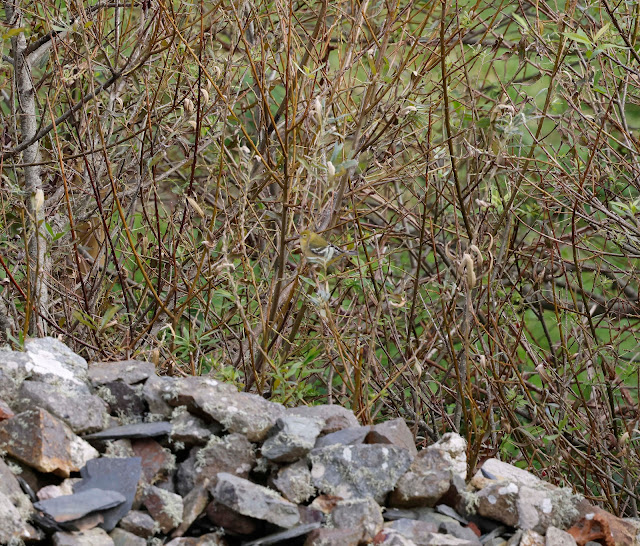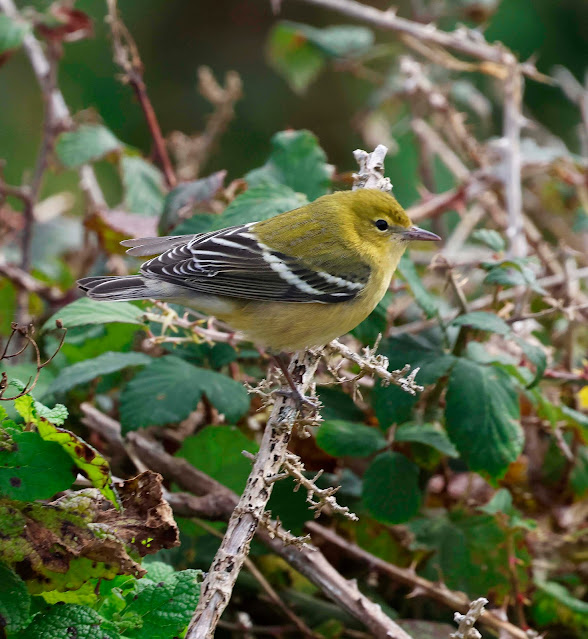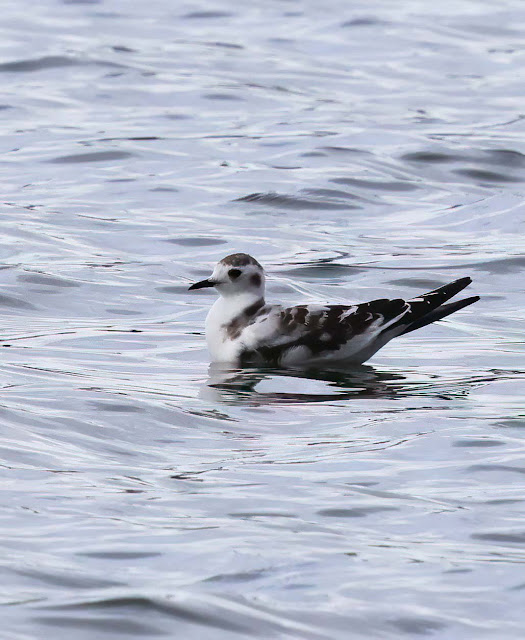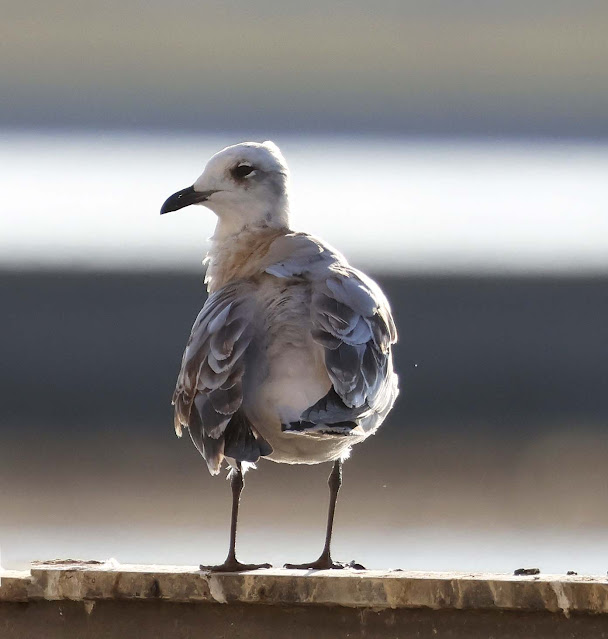We had by the skin of our teeth secured the last eight places on the third sailing at 12 noon. Anyone with a ticket had the chance of making a lot of money as large sums were being offered by desperate twitchers to anyone willing to give up their place. The tickets were a not unreasonable £17.00 if you were an RSPB member and £27.00 if not but I had heard of figures in excess of £100 being offered for a ticket.
Like the Magnolia twitch I was going to drive solo to St Justinians on the Welsh coast where I would meet my colleagues and get the boat to Ramsey Island.It made no sense to drive to Mark's house, an hour and a half's drive in the wrong direction As our sailing time was noon and the drive from my home would take four hours I had the luxury of departing at 6.30am and taking it steady.
But I am getting ahead of myself.
Friday arrived and with heart in mouth I checked BirdGuides. The Bay breasted Warbler was still present. Now we only needed it to stick for one more day but in the knowledge we would have to set off for Wales on Saturday before news came through. I remained philosophical. I could check at intervals as I drove to Wales and if the warbler was not there I would turn back
I drove at a steady pace well below the speed limit, making a couple of stops on the way for a coffee and to stretch my legs.
Approaching Carmarthen my phone rang.
It was Mark giving me the welcome news that the warbler had just been reported as showing well on Ramsey Island.Thirty minutes later Mark called again and excitedly let me know a Canada Warbler, a first for Britain had been found and was showing intermittently, close to St Govan's Point where the Magnolia Warbler was still currently viewable. It was eminently possible we could in one day see the Bay breasted Warbler, only the second for Britain and then go on to view the Canada Warbler, a first for Britain. St Justinians to St Govan's Point was only an hour's driving.
A relaxed sunny drive on uncongested roads brought me to St Davids, a pleasant touristy village on the coast and two miles beyond lay the tiny hamlet of St Justinians.A sign at the entrance to the village instructed me to turn off into a grass field, designated as a parking area for arriving birders and other visitors.
I called the others on my phone, struggling for a signal in this remote place, only to discover they had been ahead of me and were just finishing breakfast in St Davids.I decided to wait for them to join me in the field and chatted to another birder, booked on the same boat as us. The others arrived and after paying a parking fee we walked down the steep sloping road to a dead end that overlooked a rocky natural harbour below.
Birders were already massing here although we had over an hour and a half before we departed for Ramsey. Island. Most of us being regular twitchers knew each other to a greater or lesser extent and, as usual there were greetings with friends not seen since the last big twitch, endless speculation about the warbler on Ramsey Island and the momentous events currently unfolding with American passerines raining down on western Britain.
Others scoped the island, it was that close and could see the birders from an earlier boat watching the warbler near to the house that acts as a rudimentary visitor centre and home for the wardens.Some of my fellow twitchers were in a state of high anxiety, seemingly unable to curb their worries about whether the bird was showing well, how long we could remain on the island, and whether the bird might fly off before we saw it.
It wouldn't and we would see it, of that I was certain.
To add to the tension, as mentioned, rare American passerines were being reported from all along the western side of Britain. A Philadelphia Vireo was found on Barra in the company of two Red eyed Vireos, a second Black and White Warbler was trapped and ringed on nearby Bardsey Island, a Northern Parula was found on Scilly.and the Canada Warbler was still in the woods and bushes near St Govans.
The Canada Warbler, being a first for Britain was the subject of much conversation with many vowing to give the Bay breasted Warbler as little time as possible so they could get back to the mainland to see the Canada Warbler. Tick and run but that is what anxiety can do to one.
Personally I intended to spend as much time as possible with the Bay breasted Warbler before going to see the Canada Warbler.I had all day if necessary.
Inevitably with nothing to do but wait at the landing stage, talk ensued about chartering boats and/or planes to see the Philadelphia Vireo and how possible would it be to get to the Western Isles with bad weather closing in. Everyone it is fair to say was in a state of high excitement. You can imagine how this was affected by further news coming through of an Ovenbird that had been found in the middle of a field on The Isle of Rum.
There was however nothing we could do as the weather was predicted to take a turn very much for the worse from tomorrow. Planes could not fly and Calmac inevitably would find a reason to cancel ferry sailings.
I tried to reason with my colleagues.
Let's just concentrate on the Bay breasted Warbler guys.This is what we have come for, the rest can wait for a few hours
Not everyone was convinced.
Meanwhile the Alder Flycatcher was still on Skokholm and the Magnolia Warbler remained faithful to St Govan's Point. This Saturday would go down in birding folklore.There had been nothing like it. Not ever. Mark and myself were seriously wondering if we might delay going to Shetland next Friday and remain south just in case anything else was discovered, and we were not alone in thinking this way.
All the speculation and birding blather was silenced as we were called by a RSPB volunteer to check our names against a list and then ushered down, up and down some very steep steps before coming to a halt on the elevated slipway of the lifeboat station to await the arrival of our boat.
Boarding was a simple process for the ten minute crossing to Ramsey Island.Crammed in shoulder to shoulder in a highly excitable state we arrived at another steep set of steps leading up to the quayside on Ramsey Island.You could sense the eagerness and anticipation coursing through every one of us.Birders waiting on the quayside to return to the mainland told us the warbler had been showing well but only periodically
No time to stop and talk. We yomped up the hillside at a fair pace to come to a halt by the Visitor Centre.A quick set of instructions were issued by the warden as to where best to see the bird and what not to do and where not to go and then we were free to climb further to a ridge path that overlooked the Visitor Centre and an amphitheatre of gorse, bramble and a patch of willows, all variously favoured by the warbler.
Being fairly fit I raced up the hillside to get a prime position although there was really no need as there was plenty of room for all
Now it was a question of waiting. It was only a little while before someone saw the warbler, much obscured, low down in the willows and brambles. It then disappeared even lower behind a dry stone wall and apart from one brief sighting, for the next twenty minutes no one saw it. Finally it was refound, again very much obscured in the willows.I could claim to have seen bits of it, the prominent double white wing bars parts of a pale greenish body and a tail.
 |
| Can you see it? |
Amazingly this was enough for some, who decided that the Canada Warbler must have priority and promptly left to go and get one of the returning sailings, as by now the boat was running a shuttle service to return anxiety consumed twitchers to the mainland. Two of our crew succumbed to this almost mass hysteria but we remained.
After the view in the willows, I could fairly claim to have seen the Bay breasted Warbler but I wanted much better views than this.It dropped down again out of view and for a long period no one could locate it. Common Chiffchaffs, Blue Tits and Goldcrests moving through the willows and bramble brought intermittent excitement but they were all false alarms. Then the warbler was seen flying up the hillside to a more distant area of gorse and bracken. This precipitated a mass stampede up the hillside track, everyone grabbing scopes and cameras and running uphill to overlook the area the warbler had flown to.
The warbler was definitely in the gorse but where? It popped out and sat on top of a bracken frond,facing me at some distance, its breast and underparts appearing a pale buffish green before once more dropping down into the bracken and gorse. At intervals it would appear and then disappear, trying my patience at re-locating it. In the end I focused on some bare branches of gorse that it seemed particularly fond of and it would pop out every so often to perch there, its pale greenish body obvious against the darker green of the gorse. For ten minutes or more it appeared at intermittent intervals and everyone was content.We had all seen it well.
A large number of birders now left for the Canada Warbler and there was far less of a crowd on the hillside track.
The warbler, a little later flew higher to the top of the hill and despite following we could not relocate it. In true warbler fashion it preferred to feed in cover and consequently was hard to find unless and until it perched out in the open.
Twenty more anxious minutes elapsed and then it was in a bramble clump further back down the slope.How did it get there without being noticed? We walked back until it was right in front of us. I raised the camera as it perched in perfect pose below me.Just about to press the shutter and it dived into the bramble clump.
It will come out again Mark ventured
It didn't and another tense fifteen minutes passed with absolutely no sign of it
It's still in the bramble
It wasn't though. It appeared in the next clump of bramble down the slope, even closer to us and now for a blessed unforgettable minute perched right out in the open.It was now or never.
.JPG) |
| c Mark |
I said a silent prayer, every nerve in my body tingling in anticipation of finally getting a decent image of this fabled bird.
No one with a camera could fail and I made free with the shutter button to record this little beauty. Sometimes it happens like this and you get lucky as favourable circumstances combine to bring the right result.We also felt a bit of self congratulation was in order, having resisted doing an early bunk to go and see the Canada Warbler. I feel certain that the comparatively low number of us left, around twenty, made the bird feel less intimidated. Whatever the reason it was a grandstand performance and no one could quibble that they had not got the views they wanted.
The warbler shook its feathers and became active, hopping along a bramble spray and dropping into the heart of the bramble. The show was over and shortly afterwards it flew out of the bramble and down the slope to the willows where it showed briefly before becoming invisible.
 |
| Note the white in the tail restricted to the outermost two tail feathers |
You always want more, its entirely natural but we all knew we would get nothing better and so decided that it was time to leave. We walked back to the landing stage passing two seals and their pups prone on the stones of a small rocky cove below us.
The returning boat was full so we waited half an hour for the next one, chatting to the staff and scoffing coffee and biscuits purchased from the tiny shop in the Visitor Centre.This is the golden time, reflecting on a successful twitch, comparing our photos and generally feeling good about life.It does not last long maybe a few hours but boy it is good while it lasts.
It was now an hour's drive to the Canada Warbler location.
Somehow I feared the worst and my fears proved correct. Being a first for Britain and on the mainland on a Saturday the crowd would be huge and so it proved.It did not help that the warbler favoured an area of dense low woodland accessed by a narrow and by now car clogged lane. Over a hundred birders were crammed into a small corner of the wood. Some even climbing trees to get a better view and some subsequently falling out of them, The crowd was at least three deep with all the aggravation and irritability that comes in such circumstances.It was distinctly unpleasant.Courtesy and civility were certainly strangers here.
The Canada Warbler was incredibly elusive and any views were for seconds only. Because of the crowd my view was restricted to just two small gaps through the trees and scrub facing me. Occasional sightings of the warbler would prompt a mass surge of bodies towards the location but on each occasion I held my ground not wanting to lose my place. It was all I could do.
The man in front of me saw the warbler far back in the ferns and tangle below the trees but it was impossible to give precise directions.You had to just focus your bins and hope you were looking at the right spot. Invariably I wasn't! I hated the whole situation but persisted and after an hour that persistence paid off as the warbler suddenly dropped down from the right to perch for a few precious seconds on a thin branch. angled away from me in one of the gaps I was grilling.I saw its blue grey head and upperparts with a suggestion of yellow underparts before it dropped left and down out of view. I could not move because of the press of the crowd. I was the only one to see it despite alerting my neighbours to its presence.
We remained until dusk but I never saw it again and Mark never saw it at all.
So in the space of four days I had seen three megas - two in one day
A Magnolia Warbler - the third for Britain
A Bay breasted Warbler - the second for Britain
A Canada Warbler - the first for Britain
And now we are off to Shetland on Friday.
I wonder what will be there?


.JPG)
.jpg)
.jpg)
.JPG)
.jpg)





.jpg)









.JPG)
.jpg)
.jpg)

.jpg)
.jpg)
.jpg)


.jpg)














.jpg)







.jpg)